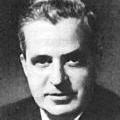 Born in Ste-Agathe-des-Monts in 1916, Jean-Jacques Bertrand attended the Séminaire de Saint-Hyacinthe and later, the Université de Montréal where he studied law. His political career began in 1948 when, under the banner of Maurice Duplessis' reigning Union Nationale, he was elected to the National Assembly. Representing the traditionally bilingual Eastern Townships riding of Missisquoi, Bertrand was re-elected several times up until the early 1970s.
Born in Ste-Agathe-des-Monts in 1916, Jean-Jacques Bertrand attended the Séminaire de Saint-Hyacinthe and later, the Université de Montréal where he studied law. His political career began in 1948 when, under the banner of Maurice Duplessis' reigning Union Nationale, he was elected to the National Assembly. Representing the traditionally bilingual Eastern Townships riding of Missisquoi, Bertrand was re-elected several times up until the early 1970s.
Seen as a progressive in his party, Bertrand held a number of cabinet portfolios over the course of his career in Quebec City, including Lands and Forests, Education, Justice, and Intergovernmental Affairs. When his long-time colleague Premier Daniel Johnson died in 1968, Bertrand was chosen to succeed him as party leader, and hence as Premier. He held the position until his party's defeat at the polls in 1970 by Robert Bourassa's Liberals.
Jean-Jacques Bertrand is known for, among other things, continuing the educational reforms instituted by the Liberals under Jean Lesage (1960-1966). Constitutionally, he was considered a strong nationalist and a defender of Quebec rights. He saw Canada as a country of two cultures and two nations. His biggest crisis as Premier occurred in 1969, with his passage of Bill 63, which though it sought to enforce the teaching of French in schools, also gave parents the right to choose the primary language of their children's education. The move sparked a language crisis in Montreal, and helped defeat the Union Nationale in 1970. After his party's defeat, Bertrand stayed on as Party leader until 1971. He died in Montreal two years later.